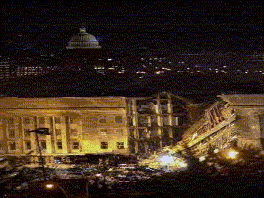Posted on March 24, 2009
A Voter-Caused Disaster
Napolitano omits our enemies
by
Daniel Clark
In an interview with the German magazine Der Spiegel, Janet Napolitano, our new Secretary of Homeland Security, said that she's rejected the word "terrorism," and has instead renamed terrorist acts "man-caused disasters," because "it demonstrates that we want to move away from the politics of fear, toward a policy of being prepared for all risks that can occur."

This is not the first instance of a Democrat administration linguistically coddling our enemies. The Clinton State Department once reclassified "rogue states" as "states of concern," and the Obama Justice Department recently discontinued its use of the term "enemy combatants," to name just a couple examples. According to the liberal worldview, in which semantics rule over substance, Iran and North Korea were needlessly provoked by George W. Bush's inclusion of them in the Axis of Evil. Presumably, if he'd instead called them the Axis of Concerned Global Citizens, they'd now be as nice as pie.
Last time there was this high-profile a prohibition of the T-word, it was when Reuters banned it from its news stories, for the reason, as stated by editor Steven Jukes, that "one man's terrorist is another man's freedom fighter." Fittingly, a similar measure is now being taken by this administration. After all, it was Barack Obama who launched his political career at the home of Weather Underground founder and "respected professor" William Ayers, thus demonstrating that one man's domestic terrorist is another man's esteemed academic colleague. Notably, Ayers gloated in an op-ed after Obama had won the presidency that "the politics of fear did not triumph."
It turns out that Napolitano is a recently reformed fearmonger herself. During her January 15th confirmation hearings, she used the words "terrorism," "counterterrorism" and "anti-terrorism" a total of no fewer than nine times. Once, she even employed the Bushian term "evildoers." Although she did once refer to a "man-made disaster" in her prepared remarks, she used that phrase to describe the rupturing of a gasoline pipeline. This was an incidental event, not a willful act of destruction, which illustrates what's wrong with applying that same language to terrorism.
A disaster is unintentional by definition. To characterize a terrorist attack as such is to absolve the terrorists of blame. In fact, it removes them from the conversation altogether. Listening to Napolitano's revised terminology, one might imagine a hijacked plane being piloted by the ghostly "Not Me" character from The Family Circus.
This new paradigm denies the existence of an ongoing campaign against America by militant Islamists, but instead characterizes their attacks as a series of unrelated managerial challenges. The Democrats have blamed Bush for not "connecting the dots" before 9-11, but now that they control the executive branch, connecting dots is considered to be a provocative act, if not a form of outright bigotry.
The Obama administration now says that to correctly identify the enemy is to practice "the politics of fear," but how could it be "politics" at all, if both parties were equally committed to defending our country? Acknowledging terrorism for what it is can only be characterized as political if it puts one party at a disadvantage, which is precisely why those who routinely obstructed Bush's efforts to kill, capture, imprison, interrogate and spy on our terrorist enemies would squeal "exploitation" whenever he'd bring up the issue.

Moreover, calling it the politics of fear suggests that the fear of Islamic terrorism is somehow unwarranted. To the contrary, anyone who was alive to see the Twin Towers fall, yet fears terrorism so little as to liken it to a storm, is living in a dreamworld.
The attacks on the World Trade Center and the Pentagon, the Khobar Towers, the USS Cole, and the American embassies in Kenya and Tanzania were not the results of changing weather patterns or shifting tectonic plates, any more than they were caused by bellicose language from previous administrations. Treating them as if they were does not help to prepare us, as Napolitano now claims. In fact, it inhibits us from preventing the next attack, because a disaster has no motives, and produces no chatter to listen to, no cash flow to disrupt, and no bad guys to nab before the deed is carried out.
Not every fear is a phobia. There are many fears that are not only rational, but necessary to one's self-preservation. Tragically, they must now include the fear of a liberal administration that is so unserious about protecting us that it tries to conduct homeland security policy by means of word games.
-- Daniel Clark is a Staff Writer for the New Media Alliance. The New Media Alliance is a non-profit (501c3) national coalition of writers, journalists and grass-roots media outlets.
The Shinbone: The Frontier of the Free Press
Mailbag . Issue Index . Politimals